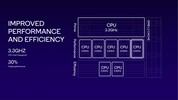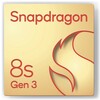Qualcomm Snapdragon 8 Gen 3 vs Qualcomm Snapdragon 8s Gen 3 vs Qualcomm Snapdragon 8 Gen 3 for Galaxy
Qualcomm Snapdragon 8 Gen 3
► remove from comparison
The Qualcomm Snapdragon 8 Gen. 3 (SM8650-AB) mobile platform is a high end SoC for Android-based smartphones and tablets.
The cryo-CPU is based on ARM's v9.2 architecture and consists of three clusters: The first includes a fast prime core (ARM Cortex-X4) with up to 3.3 GHz. The second consists of three power cores with up to 3.2 GHz and two additional cores clocking at up to 3.0 GHz (all Cortex-A720). The efficiency cluster consists of two power-saving cores (Cortex-A520) that operate at up to 2.3 GHz. The SoC uses the integrated Adreno 750 for graphics acceleration.
Compared to the Snapdragon 8 Gen. 2, Qualcomm promises a 25 percent higher GPU clock rate, whose power consumption is said to have been reduced by 25 percent at the same time. Similarly, the CPU's performance is announced to be now a whopping 30 per cent faster and requires 20 per cent less power.
A special focus is also placed on machine learning (AI). The integrated Hexagon NPU is 98% faster than its predecessor and promises a 40% improvement in efficiency. Qualcomm's AI engine is the first to support multimodal generative AI models, including LLM, LVM and ASR, and can process up to 10 trillion parameters directly on the SoC. Image manipulation is said to be possible within fractions of a second. In addition, the NPU of the Snapdragon 8 Gen 3 is also capable of INT4 and Meta Llama 2.
Also back on board is Snapdragon Sight, Qualcomm's brand for camera functions. In addition to Ultra HDR, Dolby HDR is also supported for photos. Photos can now be enhanced by generative AI models and with the Video Magic Eraser (ArcSoft), unwanted people and objects can also be removed from videos. In addition, the ISP is able to distinguish real photos from AI-generated content. This is again a triple ISP (Image Signal Processor), which works with 18 bits and up to 12 layers.
The integrated Snapdragon X75 Modem-RF 5G system allows simultaneous transfers of 5G-mmWave and 5G-Sub6, enabling data rates of up to 10 GBit/s in download and up to 3.5 GBit/s in upload. In addition, the modem is able to support all known 5G bands worldwide. Qualcomm's FastConnect 7800 is once again responsible for local communication, which can handle Bluetooth 5.4 with LE Audio and Wi-Fi 7, among other things.
The SoC is manufactured by TSMC in a 4 nm process.
Qualcomm Snapdragon 8s Gen 3
► remove from comparison
The Snapdragon 8s Gen 3 (SM8635) is a high-end SoC (system-on-a-chip) that can be used in premium smartphones and tablets (mostly Android based).
In terms of performance, it is between Snapdragon 8 Gen 2 and Snapdragon 8 Gen 3 and is based on ARM's v9.2 architecture.
The Kryo CPU consists of three clusters: the first consists of a prime core (Cortex X4) with up to 3 GHz, the second of four performance cores with up to 2.8 GHz (Cortex A720). The efficiency cluster consists of three power-saving units (Cortex A520) operating at up to 2 GHz. The SoC uses the integrated Qualcomm Adreno 735 iGPU for graphics acceleration.
Qualcomm's AI engine supports multimodal generative AI models, including LLM, LVM and ASR, and can process up to 10 trillion parameters directly on the SoC. Image manipulation should therefore be possible within fractions of a second. However, there are also drawbacks compared to the Snapdragon 8 Gen 3, as speculative decoding is not possible.
The integrated Snapdragon X70 modem enables a maximum download speed of 5 Gbit/s and an upload speed of up to 3.5 Gbit/s. The modem is also able to support all globally known 5G bands. Qualcomm's FastConnect 7800 is responsible for local communication, which also supports Bluetooth 5.4 with LE Audio and Wi-Fi 7.
The SoC is manufactured at TSMC using the 4 nm process.
Qualcomm Snapdragon 8 Gen 3 for Galaxy
► remove from comparison
The Qualcomm Snapdragon 8 Gen. 3 for Galaxy (SM8650) mobile platform is a high end SoC for Android-based smartphones and tablets. Compared to the normal SD8 Gen3, the "for Galaxy" variant offers a 90 MHz higher clocked prime core and a higher clocked GPU.
The cryo-CPU is based on ARM's v9.2 architecture and consists of three clusters: The first includes a fast prime core (ARM Cortex-X4) with up to 3.39 GHz. The second consists of three power cores with up to 3.2 GHz and two additional cores clocking at up to 3.0 GHz (all Cortex-A720). The efficiency cluster consists of two power-saving cores (Cortex-A520) that operate at up to 2.3 GHz. The SoC uses the integrated Adreno 750 for graphics acceleration.
Compared to the Snapdragon 8 Gen. 2 for Galaxy, Qualcomm promises a 25 percent higher GPU clock rate, whose power consumption is said to have been reduced by 25 percent at the same time. Similarly, the CPU's performance is announced to be now a whopping 30 per cent faster and requires 20 per cent less power.
A special focus is also placed on machine learning (AI). The integrated Hexagon NPU is 98% faster than its predecessor and promises a 40% improvement in efficiency. Qualcomm's AI engine is the first to support multimodal generative AI models, including LLM, LVM and ASR, and can process up to 10 trillion parameters directly on the SoC. Image manipulation is said to be possible within fractions of a second. In addition, the NPU of the Snapdragon 8 Gen 3 is also capable of INT4 and Meta Llama 2.
Also back on board is Snapdragon Sight, Qualcomm's brand for camera functions. In addition to Ultra HDR, Dolby HDR is also supported for photos. Photos can now be enhanced by generative AI models and with the Video Magic Eraser (ArcSoft), unwanted people and objects can also be removed from videos. In addition, the ISP is able to distinguish real photos from AI-generated content. This is again a triple ISP (Image Signal Processor), which works with 18 bits and up to 12 layers.
The integrated Snapdragon X75 Modem-RF 5G system allows simultaneous transfers of 5G-mmWave and 5G-Sub6, enabling data rates of up to 10 GBit/s in download and up to 3.5 GBit/s in upload. In addition, the modem is able to support all known 5G bands worldwide. Qualcomm's FastConnect 7800 is once again responsible for local communication, which can handle Bluetooth 5.4 with LE Audio and Wi-Fi 7, among other things.
The SoC is manufactured by TSMC in a 4 nm process.
| Model | Qualcomm Snapdragon 8 Gen 3 | Qualcomm Snapdragon 8s Gen 3 | Qualcomm Snapdragon 8 Gen 3 for Galaxy | ||||||||||||||||||||||||||||||||||||
| Codename | Cortex-X4 / A720 / A720 / A520 (Kryo) | Cortex-X4 / A720 / A720 / A520 (Kryo) | Cortex-X4 / A720 / A720 / A520 (Kryo) | ||||||||||||||||||||||||||||||||||||
| Series | Qualcomm Snapdragon 8 | Qualcomm Snapdragon 8 | Qualcomm Snapdragon 8 | ||||||||||||||||||||||||||||||||||||
| Series: Snapdragon 8 Cortex-X4 / A720 / A720 / A520 (Kryo) |
|
|
| ||||||||||||||||||||||||||||||||||||
| Clock | 2300 - 3300 MHz | 2000 - 2800 MHz | 2300 - 3390 MHz | ||||||||||||||||||||||||||||||||||||
| L3 Cache | 8 MB | 8 MB | 8 MB | ||||||||||||||||||||||||||||||||||||
| Cores / Threads | 8 / 8 1 x 3.3 GHz ARM Cortex-X4 3 x 3.2 GHz ARM Cortex-A720 2 x 3.0 GHz ARM Cortex-A720 2 x 2.3 GHz ARM Cortex-A520 | 8 / 8 1 x 3.0 GHz ARM Cortex-X4 4 x 2.8 GHz ARM Cortex-A720 3 x 2.3 GHz ARM Cortex-A520 | 8 / 8 1 x 3.4 GHz ARM Cortex-X4 3 x 3.2 GHz ARM Cortex-A720 2 x 3.0 GHz ARM Cortex-A720 2 x 2.3 GHz ARM Cortex-A520 | ||||||||||||||||||||||||||||||||||||
| Technology | 4 nm | 4 nm | 4 nm | ||||||||||||||||||||||||||||||||||||
| Features | Adreno GPU, Spectra ISP, Hexagon, X70 5G Modem, FastConnect 7800 Wi-Fi 7, LPDDR5x 4800 MHz Memory Controller | Adreno GPU, Spectra ISP, Hexagon, X70 5G Modem, FastConnect 7800 Wi-Fi 7, LPDDR5x 4800 MHz Memory Controller | Adreno GPU, Spectra ISP, Hexagon, X70 5G Modem, FastConnect 7800 Wi-Fi 7, LPDDR5x 4800 MHz Memory Controller | ||||||||||||||||||||||||||||||||||||
| iGPU | Qualcomm Adreno 750 ( - 903 MHz) | Qualcomm Adreno 735 | Qualcomm Adreno 750 ( - 1000 MHz) | ||||||||||||||||||||||||||||||||||||
| Architecture | ARM v9 | ARM v9.2 | ARM v9 | ||||||||||||||||||||||||||||||||||||
| Announced | |||||||||||||||||||||||||||||||||||||||
| Manufacturer | www.qualcomm.com | www.qualcomm.com | www.qualcomm.com |
Benchmarks
Average Benchmarks Qualcomm Snapdragon 8 Gen 3 → 100% n=23
Average Benchmarks Qualcomm Snapdragon 8s Gen 3 → 84% n=23
Average Benchmarks Qualcomm Snapdragon 8 Gen 3 for Galaxy → 102% n=23
* Smaller numbers mean a higher performance
1 This benchmark is not used for the average calculation













